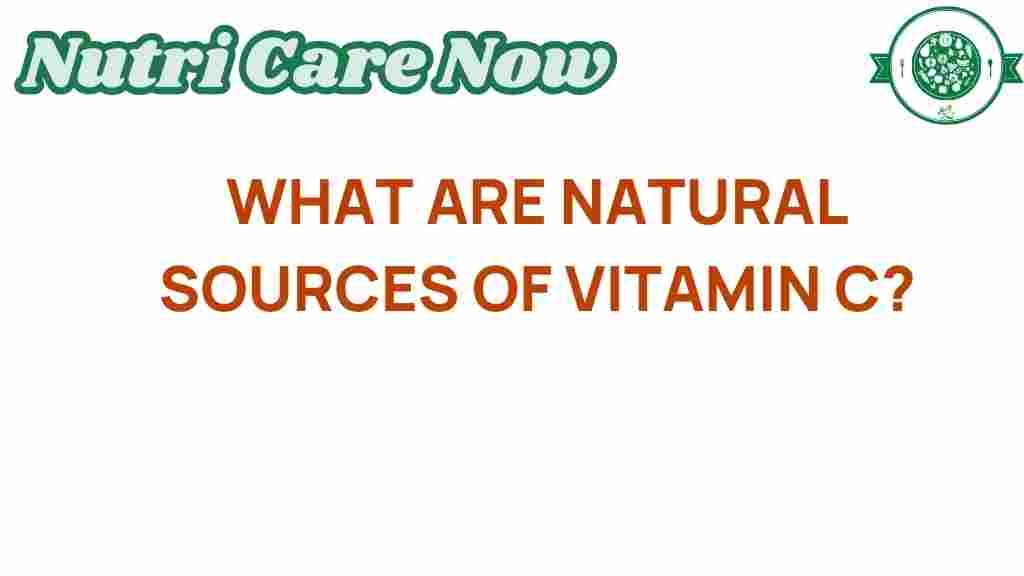Unveiling the Hidden Gems of Natural Vitamin C Sources
Vitamin C, also known as ascorbic acid, is a vital nutrient that plays a crucial role in maintaining our health. This powerful antioxidant is celebrated for its numerous health benefits, including boosting immunity, improving skin health, and enhancing iron absorption. While most people associate vitamin C with citrus fruits, there are a plethora of natural sources that provide this essential nutrient. In this article, we will explore these hidden gems, their nutritional value, and how to incorporate them into your diet for optimal health.
The Importance of Vitamin C
Vitamin C is essential for various bodily functions. It aids in the growth and repair of tissues, helps produce collagen, and is vital for the immune system. Additionally, vitamin C acts as an antioxidant, protecting cells from damage caused by free radicals. This nutrient is also known to improve mood and cognitive function, making it a crucial component of a balanced diet.
Natural Sources of Vitamin C
While citrus fruits like oranges and lemons are well-known for their vitamin C content, many other natural sources are packed with this essential nutrient. Here’s a closer look at some of the top sources:
- Citrus Fruits: Oranges, grapefruits, lemons, and limes are rich in vitamin C. One medium orange contains about 70 mg of vitamin C.
- Berries: Strawberries, blueberries, and raspberries are not only delicious but also high in antioxidants and vitamin C. One cup of strawberries can provide more than 100% of your daily requirement.
- Leafy Greens: Spinach, kale, and Swiss chard are excellent sources of vitamin C. One cup of cooked spinach offers around 17 mg of vitamin C.
- Peppers: Bell peppers, especially the red variety, contain even more vitamin C than citrus fruits. One medium red pepper can provide over 150 mg of vitamin C.
- Kiwi: This small fruit packs a punch with about 71 mg of vitamin C per medium-sized kiwi.
- Broccoli: This cruciferous vegetable is not just a great source of fiber but also contains significant amounts of vitamin C. One cup of cooked broccoli provides around 101 mg of vitamin C.
- Tomatoes: Fresh tomatoes and tomato juice are also good sources, with one medium tomato providing about 20 mg of vitamin C.
Health Benefits of Vitamin C
Incorporating vitamin C-rich foods into your diet can lead to numerous health benefits, including:
- Boosted Immunity: Vitamin C plays a significant role in enhancing the immune system’s function, helping your body to fight off infections.
- Antioxidant Protection: As an antioxidant, vitamin C protects cells from oxidative stress and may lower the risk of chronic diseases.
- Improved Skin Health: Vitamin C is essential for collagen production, which helps maintain skin elasticity and reduces signs of aging.
- Enhanced Iron Absorption: Consuming vitamin C alongside iron-rich foods can improve the absorption of non-heme iron, which is crucial for preventing anemia.
How to Incorporate More Vitamin C into Your Diet
To reap the benefits of vitamin C, consider the following steps:
- Start Your Day with Citrus: Add slices of orange or grapefruit to your breakfast. Smoothies made with berries and spinach are also a great option.
- Snack on Fruits: Keep fruits like kiwi and strawberries on hand for healthy snacks throughout the day.
- Add Vegetables to Every Meal: Incorporate bell peppers, broccoli, or leafy greens into your meals. Stir-fries, salads, and soups are excellent ways to do this.
- Choose Fresh Over Processed: Fresh fruits and vegetables are typically richer in vitamin C than their canned or processed counterparts.
Vitamin C Supplements
While obtaining vitamin C from natural sources is ideal, some individuals may benefit from supplements, especially if they have specific dietary restrictions or health conditions. Vitamin C supplements come in various forms, including:
- Ascorbic Acid: The most common form of vitamin C supplement.
- Buffered Vitamin C: A gentler form that may be easier on the stomach.
- Liposomal Vitamin C: Encapsulated in liposomes for better absorption.
Before starting any supplement regimen, it’s essential to consult with a healthcare professional to determine the right dosage and form for your individual needs.
Potential Side Effects of Excess Vitamin C
While vitamin C is water-soluble and generally safe, excessive intake from supplements can lead to side effects such as:
- Digestive issues (diarrhea, nausea)
- Abdominal cramps
- Increased risk of kidney stones
It’s best to obtain vitamin C from natural sources whenever possible, as whole foods come with additional nutrients and fiber that supplements lack.
Troubleshooting Tips
If you are struggling to get enough vitamin C in your diet, consider these troubleshooting tips:
- Plan Your Meals: Create a weekly meal plan that includes a variety of vitamin C-rich foods.
- Experiment with Recipes: Try new recipes that incorporate fruits and vegetables high in vitamin C.
- Keep Snacks Handy: Prepare bags of washed and cut fruits and vegetables for easy snacking.
Conclusion
Vitamin C is an indispensable nutrient that offers a multitude of health benefits. By incorporating a variety of natural sources into your diet, such as citrus fruits, berries, and leafy greens, you can ensure that you meet your nutritional needs. Remember that while supplements can be helpful, they should not replace the rich array of vitamins, minerals, and antioxidants found in whole foods. For more information on vitamin C and its benefits, check out this resource. By focusing on a balanced diet rich in vitamin C, you can bolster your immunity, enhance your skin health, and enjoy overall well-being.
For additional tips on nutrition and healthy eating, visit our health and wellness page.
This article is in the category Health and created by NutriCareNow Team
